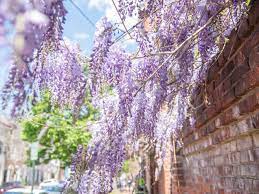 Novelist Henry James thought the words “summer afternoon” were the most beautiful in the English language. I love that phrase, especially in July when I am sitting in a shaded spot with a glass of iced tea and a good book. Still, in my mind, “summer afternoon” comes in second to the phrase “sunny Saturday morning”.
Novelist Henry James thought the words “summer afternoon” were the most beautiful in the English language. I love that phrase, especially in July when I am sitting in a shaded spot with a glass of iced tea and a good book. Still, in my mind, “summer afternoon” comes in second to the phrase “sunny Saturday morning”.
On a sunny Saturday morning during the growing season, the weekend stretches in front of you like a cat after a long nap. Optimism and energy are at a peak and the door is closed on whatever troubles happened during the work week. On a sunny Saturday morning, I feel as if I can take on the devil and his minions, which in my garden means an army of groundhogs aided and abetted by the battery of rampant vines that have escaped my neighbor’s yard and threaten to wreak havoc in mine.
Last Saturday I dumped a week’s worth of used cat litter down the main groundhog hole and took on the vines.
Decades, or possibly eons ago, one of my neighbor’s predecessors planted wisteria along the property line. I am reasonably sure her horticultural and aesthetic intentions were good.
Fast forward to the present, and the wisteria has run amok, rampaging through nearby trees and insinuating itself onto my property by oozing under the boundary fence via underground roots. Worse yet, the wisteria loves company and brings along undesirable fellow travelers like self-sown honeysuckle and bittersweet, not to mention feral forsythia and poison ivy. The privet hedge that was installed decades ago to maintain order between the properties is perpetually threatened with strangulation.
Clearly, an invasion of marauders threatened my garden, as is the case every year at this time. It was imperative to marshal all the available sunny-Saturday-morning-energy to combat the leafy mayhem makers.
Armed with clippers, loppers, a pruning saw and a rake, plus the kind of determination that only takes hold in the earliest hours of the weekend, I launched an assault. At the end of 45 minutes of intense combat, the enfeebled privet was rescued from slow death and breathing near-audible sighs of relief and had a chance of recovering its lost vigor. .
After disposing of the debris left behind after the War of the Wisteria, I had an invigorating cup of tea and decided that I still had enough energy to take on the oak leaf hydrangea—Hydrangea quercifolia—in front of the house.
There are two things everyone should know about oakleaf hydrangea. First, it is a beautiful native shrub that provides interest in all seasons. Its showy flower panicles shine in spring and early summer, the big, oak-like green leaves turn crimson in fall, and eye-catching exfoliating bark takes pride of place on bare branches in late fall and winter. Second, oakleaf hydrangeas tend to grow like wildfire and sucker with abandon. Saturday mornings are the only time to deal with specimens like the one in front of my house, whose aggressive tendencies make neighboring plants quake with fear. When it gets out of hand, its size also makes it hard for the pizza delivery man to find the front porch.
Suffice it to say that after last Saturday, I can once again order pizza with impunity. The oakleaf is now fully shorn. The root suckers, which had grown rather large at its base, are a thing of the past, replaced by a thick carpet of mulch. On the left side of the oakleaf, a lilac now has room to flex its branches, and the mophead hydrangea on the right may have a chance of showing off its flowers later in the season.
With the remaining Saturday morning energy, I also cleaned out one of the front garden beds, raking up the winter’s accumulation of dead leaves and cutting back the last of the desiccated aster stalks. This gave the crocuses, daffodils and emerging hyacinths a clear canvas on which to paint their spring colors.
After all of that activity, I ate lunch, basking in the glow of satisfaction that comes from vigorous exercise and a job well done. I was also able to use part of the afternoon for that other source of weekend salvation, a long nap. With all due respect to Henry James, I think “long Saturday nap” may be the second most beautiful phrase
